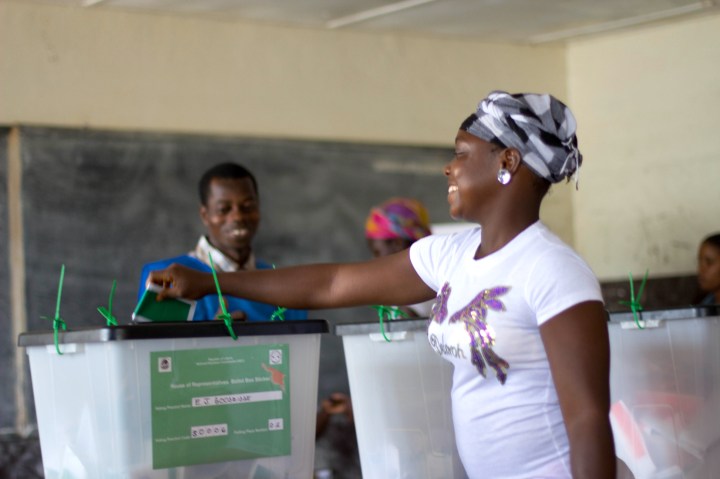ISS TODAY OP-ED
Intense rivalry makes transparency vital in Liberia’s runoff election

As campaigning opens for the presidential runoff, several concerns from the first round of voting must be addressed.
Liberia’s 10 October elections marked a significant milestone for the fledgling democracy. They were the first general elections managed entirely by the government since the end of the civil war in 2003. External actors managed various aspects of previous polls, notably the United Nations Mission in Liberia, which provided security in all post-war general elections except the most recent one.
The polls elected a president, 15 senators and 73 members of the House of Representatives, and were seen as a public verdict on the management of the economy and fight against corruption. Of the 20 presidential candidates, Joseph Boakai of the main opposition Unity Party (UP) and incumbent George Weah of the Congress for Democratic Change (CDC) were the frontrunners.
In a shift from the first round of presidential election results in 2017 – when Weah garnered a 10-percentage-point lead over Boakai – Boakai this time trailed by only 0.39 percentage points, with 43.44% of the votes to Weah’s 43.83%. With no frontrunners attaining an absolute majority, a runoff election has been scheduled for 14 November.
Some main opposition figures have threatened to foment unrest if the election is rigged.
Despite being widely acclaimed by the international community, the first round of voting recorded some irregularities, leading to the arrest of nine people for election fraud. This resulted in a dispute between the National Elections Commission (NEC) and the opposition, with three opposition parties calling for a forensic examination of used and unused ballot papers. Given the high stakes, the need for transparency in the runoff is greater than ever.
Intense rivalry
Rivalry remains intense between the frontrunners, with both parties holding nothing back in their quest for victory. During the first round, when the NEC had released results for only 16 of 5,890 polling stations, the UP and the ruling CDC began asserting their claims to victory. This clearly violated electoral regulations and the 2023 Farmington River Declaration, invoking public fears of tensions escalating between the two political parties.
As campaigning opens for the runoff, several concerns from the first round of voting must be addressed. Provocative political rhetoric and the physical confrontations that incited violence have resurfaced. Some main opposition figures have threatened to foment unrest if the election is rigged. These threats must be taken seriously as similar warnings ahead of the first round led to a series of violent encounters, especially between the UP and CDC.
These clashes are partly borne out of deep suspicion and mistrust between the two major parties. Evidence of this emerged when the main opposition rejected the 2022 National Population and Housing Census, which it said was misrepresentative and aimed at manipulating the general elections.
Questions about the competence and impartiality of the NEC also linger. Civil society groups and opposition parties criticised Weah’s appointments of people to the board of commissioners, who they perceived as partisan. The president’s refusal to allow the opposition to appoint some commissioners also drew censure, especially since Ellen Johnson Sirleaf had extended this courtesy to Weah when he was in opposition.
Questions about the evenness of the playing field also haunt this election and must be addressed in future. Both the ruling party and main opposition have been accused of pre-campaign activity and violation of campaign financing laws, along with other serious violations of the new electoral legislation.
The challenges facing Liberia are not unfamiliar. Nigeria and Sierra Leone had similar issues in their general elections, reinforcing longstanding concerns about the transparency and credibility of polls in west Africa. To avoid the uncertainty and tension that followed voting in Nigeria and Sierra Leone, authorities must prioritise transparency in the runoff. That will require building public trust and confidence in the electoral process – and must start with the NEC.
The two political parties must ensure their members refrain from using hate speech.
As it gathers materials for the runoff elections, the NEC must ensure the availability of adequate voting equipment and materials across all precincts and polling stations. The joint security task force and political party agents must be on high alert during voting, tallying and collation to prevent ballot box theft, which occurred in the first round. Disruptions of tallying centres observed in Nimba and Montserrado should be anticipated and prevented.
Read more in Daily Maverick: Liberia: Lessons learnt after moving the poster child of death and destruction in the right direction
The relatively high proportion of invalid votes (5.8%) recorded in the first round of voting must be averted in the runoff, as that could easily change the fortunes of either candidate. Authorities should embark on more civic and voter education, and both political parties need equal airtime on state media.
A clampdown on misinformation and disinformation is also needed. The two political parties must ensure their members refrain from using hate speech, and avoid claiming victory ahead of the final result declaration by the NEC.
Much as a smooth democratic transition remains a triumph for Liberia, it also marks a round of fierce competition. In such a tense atmosphere, where hopes and expectations will be realised for some and crushed for others, emotions are heightened and must not be given cause to flare. DM
David Kofi Asante-Darko is a Research Analyst with the West Africa Democracy Solidarity Network. Enoch Randy Aikins is a Researcher, African Futures and Innovation, Institute for Security Studies (ISS) Pretoria.
First published by ISS Today.


















 Become an Insider
Become an Insider
Comments - Please login in order to comment.